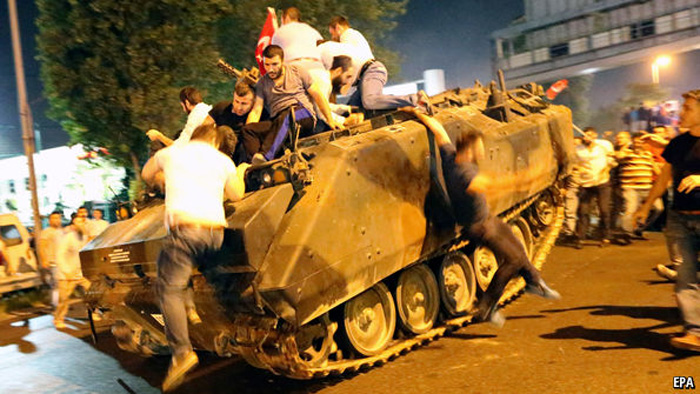TURKEY has seen four governments ousted by its military in the space of four decades, most recently in the late 1990s. Yet until July 15th, another coup had been considered extremely unlikely. Many army officials resent Turkey’s increasingly authoritarian president, Recep Tayyip Erdogan, for his attempts to reshape society along Islamic lines and to rein in the military, but few had reason to think that an attempt to depose him could be successful. Mr Erdogan has won every election since 2002, and retains the support of roughly half the electorate. Thanks to over a decade of economic prosperity, even committed opponents consider him a lesser evil than army rule. As one Turkish journalist tweeted on July 15th: “The worst kind of democracy is better than a coup.”
The coup was dismantled in a matter of hours amid a massive show of popular support for civilian rule. At least 265 people were killed, according to official sources. Mr Erdogan has emerged from the episode stronger than ever. His longstanding goal of changing the constitution to grant the presidency executive powers may be within reach.
The Turkish president is masterful at playing both victor and victim—a man who brought Turkey’s secularist old guard to heel and gave a voice to the country’s conservatives, but who also claimed to be surrounded by enemies both at home and abroad. For Mr Erdogan, the world is divided into two groups: on the one hand, his voters; on the other, a dizzying coalition of foes that includes the political opposition, Western countries allegedly envious of Turkey’s progress, the global financial elite, and a secretive Islamic movement, the Gulen community. In the eyes of his supporters, the coup attempt has proven Mr Erdogan right. He can now claim a popular mandate for amassing even more power and eliminating the remaining centres of opposition.
The army will be the first target for a purge. To the relief of most Turks, the military is no longer the alternative power base it once was, and the coup had the support of only part of the officer corps. “This was not a coup by the military as an institution,” says Gareth Jenkins, a security expert. Akin Unver, an assistant professor at Kadir Has University, calls it “more of a mutiny”. Still, the plotters deployed large numbers of troops and heavy armour in both Istanbul and in Ankara, where their aircraft bombed the national parliament. Over 2,800 military personnel, including a number of generals, have been arrested.
Another target will be the Gulen movement, a Muslim sect headed by a cleric, Fethullah Gulen, who was an ally of Mr Erdogan before falling out with him in 2013. The government immediately charged the group with masterminding the violence. “The coup attempt has Gulenist fingerprints all over it,” said one Turkish official, who claimed that the leaders were in communication with senior members of the movement. The government labelled the Gulenists a terrorist group earlier this year, and it now has a green light to pursue anyone even remotely suspected of links to them. On July 16th, the prime minister, Binali Yildirim, demanded that America extradite Mr Gulen, who lives in Pennsylvania. “The country that stands behind this man is no friend to Turkey,” he warned.
In parliament, Mr Erdogan has long sought to undermine his political opposition. Last summer he responded with massive force to a growing insurgency in the southeast by groups linked to the banned Kurdistan Workers’ Party (PKK), fanning the flames of the violence and providing an excuse to link moderate Kurdish MPs to the terrorists. They have since been stripped of parliamentary immunity, and now face terrorism charges. Bomb attacks by the PKK and by Islamic State, which Turkey is battling in Syria, have legitimised a government crackdown on independent media and free expression. The main independent newspapers and television stations have been taken over by government-friendly management. Prosecutors have opened some 2000 cases against people suspected of insulting the president since 2014. After the coup, such repression will probably intensify.
Perhaps most troubling, the coup provides an opportunity to eliminate what remains of Turkey’s independent judiciary. On July 16th, the government announced that over 2,700 judges had been suspended from duty. Officials also confirmed that two members of the constitutional court had been detained.
The irony is that the coup’s failure demonstrated just how slight a threat Mr Erdogan actually faces. Practically the entire political class, as well as the overwhelming majority of Turkish citizens, Erdogan supporters and opponents alike, spoke out against the coup. That is the good news. The bad is that today’s sense of unity risks being drowned out tomorrow by calls for vengeance. The day after the coup attempt a group of men clad in Turkish flags marched down Istanbul’s main street shouting “We want executions”. (Turkey’s government scrapped the death penalty in the early 2000s.) Photographs and video footage from the coup’s aftermath showed protesters on one of Istanbul’s bridges beating soldiers and whipping them with their belts.
For Mr Erdogan, the failed coup is a golden opportunity to heal a deeply divided society. Past experience suggests that he will instead respond with a vicious crackdown. During the night of July 15th, Turks of all stripes managed to protect their country from a relapse into military rule. The fragile democracy that dozens of them died to defend is now in Mr Erdogan’s increasingly untrustworthy hands.







Comments